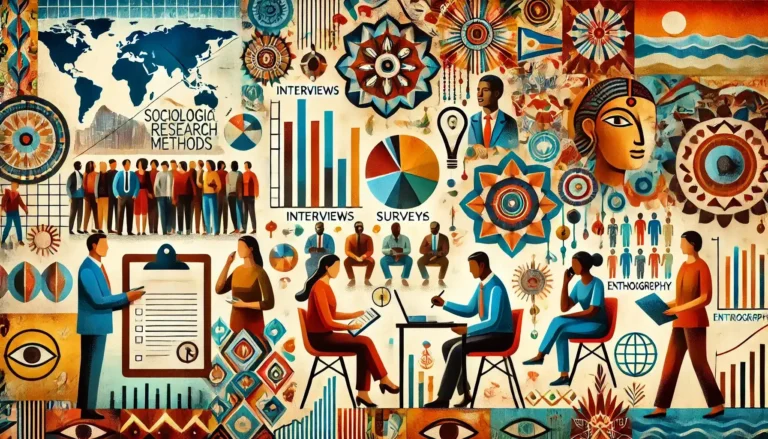Hey there! Ever stop to wonder how sociologists manage to unravel the tangled mess of human societies? From the quirky little rituals that guide our daily lives to the big cultural trends that shape entire nations, sociology gives us the tools to make sense of it all. Think of sociological methods as a kind of detective’s magnifying glass—except instead of solving crimes, we’re decoding the secrets of social life.
So, grab a cup of coffee (or tea, if that’s your thing), and let’s chat about how sociologists do their thing. We’ll dive into the rituals of research, some sharp critiques, and how we can make it all better in the future.
The Rituals of Sociological Research
Sociology isn’t just about gathering data; it’s an art form. Picture a choreographed dance, with surveys, interviews, and observations serving as the steps. These rituals aim to uncover the deeper truths of how we live, work, and interact.
- Analysis and Codification: Once they’ve collected data, sociologists dig in, looking for patterns like a kid hunting for shapes in the clouds. What’s the story behind those numbers?
- Interpretation: This is where the magic happens—reading between the lines, piecing together how individual actions fit into the big picture.
- Reflection: And just like you’d question your life choices after a 2 a.m. online shopping spree, sociologists critically assess their methods and assumptions. It’s all about keeping things real.
The Critique of Abstracted Empiricism
Of course, sociology has its critics, and one big beef is with something called “abstracted empiricism.” Fancy term, right? But all it really means is relying too much on numbers and stats, often at the expense of the rich, juicy details of real life.
- Western-Centric Focus: A lot of this work leans heavily on Western norms, which can skew results. Imagine trying to understand an Italian family dinner using British table manners—things might get lost in translation.
- Generalization Challenges: And then there’s the issue of one-size-fits-all conclusions. What works for one culture doesn’t always apply to another.
Understanding Societies Beyond Numbers
So, how do we go beyond numbers? Simple: we embrace the human side of things. Sociologists know that to truly get what makes society tick, you’ve got to dive into stories, symbols, and meanings.
- Qualitative Research: Deep interviews, ethnography (basically immersing yourself in a culture), and case studies bring the human experience to life.
- Narrative Analysis: Every story has themes, and analyzing them helps uncover the bigger picture.
- Participatory Approaches: Working directly with communities means getting insights straight from the source. It’s like asking your grandma for her secret cookie recipe instead of guessing the ingredients.
Embracing a Global Perspective
Sociology has to think big—really big. To get past the Western bias, we need to look at societies from all over the world, respecting the unique ways they’re built.
- Comparative Studies: Ever compare two wildly different TV shows and notice universal themes? Sociology does that with cultures.
- Cross-Cultural Sensitivity: It’s about recognizing that what makes sense in one society might be completely different somewhere else—and that’s okay!
Reimagining Sociological Methods for the Future
The world’s always changing, and sociology has to keep up. This means trying out new tools, teaming up with other fields, and staying humble about the whole process.
- Innovative Data Collection: Social media, big data, even crowdsourcing—these tools are like the Swiss Army knives of modern research.
- Interdisciplinary Collaboration: Mixing sociology with psychology, anthropology, or even data science can lead to some pretty mind-blowing discoveries.
- Reflective Practice: And, of course, always questioning biases and ethical dilemmas.
Wrapping It Up
So there you have it—a whirlwind tour of how sociologists peek under society’s hood. It’s part science, part art, and part philosophy. By blending numbers with narratives and local stories with global insights, sociologists can create a fuller, richer picture of humanity.
What do you think? Are there better ways to study society? How can we balance the hard data with the soft stories? Let’s keep the conversation going!



